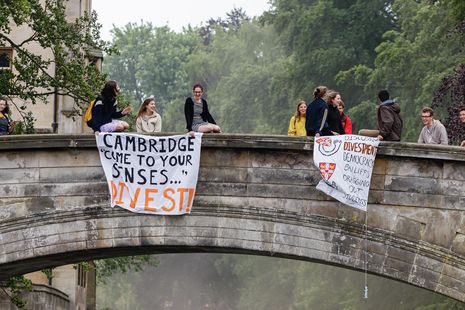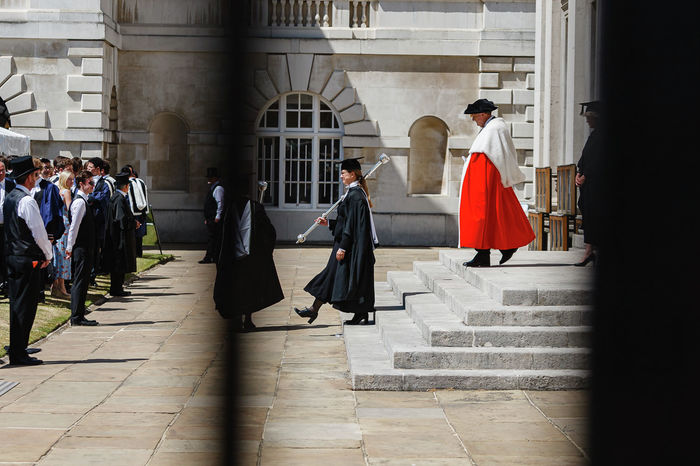Grassroots student activism has outgrown Cambridge’s political societies
Columnist Fatima Zahra Yusuf looks at how grassroot student activism has spearheaded the transformative change she envisions, and asks political societies to step up

One of the things that drew me to Cambridge, apart from the amazing social life, was its political scene. As a politics student applying to university, I was keen on building upon the activist work I did back at home. From the prestigious Cambridge Union to the myriad of college-affiliated political societies, these groups have provided platforms for spirited debate and intellectual discourse. However, after a few appearances at some of these, a disheartening truth emerged: for all their spirited debates and intellectual posturing, they seemed more like echo chambers than engines of change. What we should be looking at is grassroot student activism, which is pioneering the real social change we (or at least I) want to see.
Throughout its history, Cambridge University has seen plenty of examples of students organisation. One example is the sizable demonstration outside the Cambridge Union in November 1968 opposing Enoch Powell’s contentious rhetoric on immigration. Similarly, in February 1969, the Cambridge University South Africa Committee mobilised 200 campaigners to protest Trinity College’s planned tour of South Africa. These episodes serve as reminders of what student activism at Cambridge can look like.
“It’s baffling to sit in a plush Cambridge room, sipping port, and discussing issues that profoundly affect people’s lives as if they were distant curiosities”
However, it’s essential not to romanticise the University as an engine of social change. Cambridge’s history is also marked by darker legacies, such as the involvement of several college alumni in slave plantations in the Americas, and more recent controversies like colleges investing in arms manufacturers and companies funding conflict in Gaza. My point is that there have been many moments when our university community rallied together, showing the potential for impactful collective action. I want more of that genuine solidarity and less of the empty rhetoric that often feels like little more than armchair anthropology. It’s baffling to sit in a plush Cambridge room, sipping port, and discussing issues that profoundly affect people’s lives as if they were distant curiosities.
Indulging in essentially a bottomless drinks session at Cambridge’s political societies is fun once or twice, but how many times can we rehash the New Labour discourse? It’s just a bit boring. The repetitive nature of these societies tends to obscure the community of activists I was looking for when I arrived.
Furthermore, these societies can even become breeding grounds for the same problems which seep into our political institutions. How are we meant to have a representative Westminster, when we are barely encouraging POC and individuals from marginalised backgrounds to enter these spaces? Coming from a Muslim background, I know first-hand that for most people in my community, these spaces are not the most inviting. The prevalent drinking-heavy culture not only alienates non-drinkers but also tends to attract a particular segment of individuals, often characterised as “champagne socialists”. These gatherings frequently consist of wine-sipping (or vodka-shotting) sessions where discussions revolve around the Prime Minister’s next move.
Now, before I get any backlash, I’ve been to a pint and policy and had a good time. Particularly with the sillier motions. But a quick scan of the room makes it evident that there is still significant room for improvement. The lack of inclusivity undermines the efficacy of these platforms to reflect the broader societal landscape. As one contemplates the landscape of student politics, then, it’s clear they just don’t facilitate the change I would want to see.
“Political societies have the influence to make a significant impact”
However, not all hope is lost! A new wave of student activism has filled the role that I thought political societies would take on. From campaigns for climate justice to calls for divestment from arms, these grassroots movements are a testament to the power of student voices when they are united for a common purpose.
The encampments are the first example that comes to mind. The sheer effort and resilience in Cambridge students coming together for a common goal, I think, is truly remarkable and is exactly the type of bold activism that I want to see. Cambridge Climate Justice is another grassroots campaign that has done some incredible work, resulting in Cambridge University committing to remove all direct and indirect investments in the fossil fuel industry from its £3.5bn endowment fund by 2030.
Grassroots organisations thrive on their flexibility and lack of external restrictions which enable these transformative changes. However, political societies have the power to make an equally significant impact. As the Events Officer of the Lucy Cavendish Politics Society, I know we have the budget and audience to drive real change. As an active member of my political society, I’m calling myself out too. Seeing the impact of student activist groups worldwide, it’s time for us to step up. To truly make the change that people want to see, these societies need to transcend discussion and mobilise members to participate in community service and activism.
Political societies should be doing more than just talking about change – they should be making it. Until then, we are left with lukewarm societies that do nothing more than drink away the evenings and rehash Blair’s sins. In the meantime, if you can, go support your local community kitchen and get involved in the wider Cambridge community – therein lies the opportunity to enact real change.
 News / Cambridge academics stand out in King’s 2026 Honours List2 January 2026
News / Cambridge academics stand out in King’s 2026 Honours List2 January 2026 Interviews / You don’t need to peak at Cambridge, says Robin Harding31 December 2025
Interviews / You don’t need to peak at Cambridge, says Robin Harding31 December 2025 Comment / What happened to men at Cambridge?31 December 2025
Comment / What happened to men at Cambridge?31 December 2025 Features / “It’s a momentary expression of rage”: reforming democracy from Cambridge4 January 2026
Features / “It’s a momentary expression of rage”: reforming democracy from Cambridge4 January 2026 News / Varsity’s biggest stories of 202531 December 2025
News / Varsity’s biggest stories of 202531 December 2025










